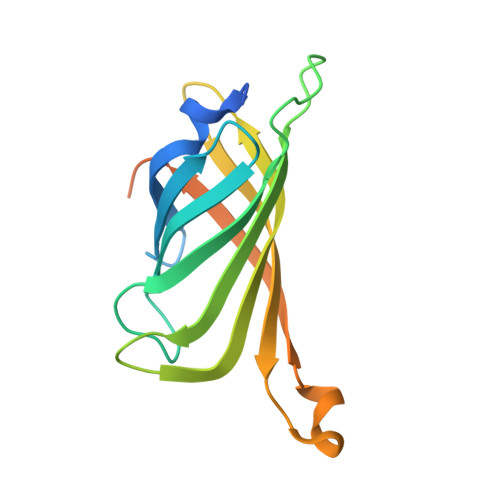Artificial Iron Proteins: Modeling the Active Sites in Non-Heme Dioxygenases.
Miller, K.R., Paretsky, J.D., Follmer, A.H., Heinisch, T., Mittra, K., Gul, S., Kim, I.S., Fuller, F.D., Batyuk, A., Sutherlin, K.D., Brewster, A.S., Bhowmick, A., Sauter, N.K., Kern, J., Yano, J., Green, M.T., Ward, T.R., Borovik, A.S.(2020) Inorg Chem 59: 6000-6009
- PubMed: 32309932
- DOI: https://doi.org/10.1021/acs.inorgchem.9b03791
- Primary Citation of Related Structures:
6UI0, 6UIU, 6UIY, 6UIZ, 6US6 - PubMed Abstract:
An important class of non-heme dioxygenases contains a conserved Fe binding site that consists of a 2-His-1-carboxylate facial triad. Results from structural biology show that, in the resting state, these proteins are six-coordinate with aqua ligands occupying the remaining three coordination sites. We have utilized biotin-streptavidin (Sav) technology to design new artificial Fe proteins (ArMs) that have many of the same structural features found within active sites of these non-heme dioxygenases. An Sav variant was isolated that contains the S 112 E mutation, which installed a carboxylate side chain in the appropriate position to bind to a synthetic Fe II complex confined within Sav. Structural studies using X-ray diffraction (XRD) methods revealed a facial triad binding site that is composed of two N donors from the biotinylated ligand and the monodentate coordination of the carboxylate from S 112 E. Two aqua ligands complete the primary coordination sphere of the Fe II center with both involved in hydrogen bond networks within Sav. The corresponding Fe III protein was also prepared and structurally characterized to show a six-coordinate complex with two exogenous acetato ligands. The Fe III protein was further shown to bind an exogenous azido ligand through replacement of one acetato ligand. Spectroscopic studies of the ArMs in solution support the results found by XRD.
Organizational Affiliation:
Department of Chemistry, 1102 Natural Science II, University of California, Irvine, California 92697, United States.















